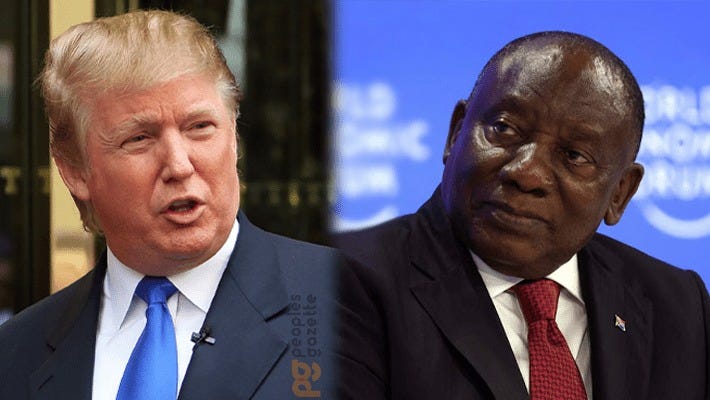THE BATTLE OVER SOUTH AFRICAN LAND REFORM...
TRUMP, MUSK, AND THE POLITICS OF CONTROL!
The West’s Meddling in Africa
As someone who was born and raised in New York City but now resides permanently in Ghana, I’ve made it my mission to highlight the stories that the Western media won’t touch. Western governments have long had a vested interest in Africa—not for our benefit, but for their control. What’s happening now in South Africa is no exception.
Recent tensions between South African President Cyril Ramaphosa, Economic Freedom Fighters (EFF) leader Julius Malema, Elon Musk, and former U.S. President Donald Trump have brought South Africa’s land reform policies into the global spotlight. At the heart of the issue is South Africa’s Expropriation Act, a law aimed at addressing historic land injustices dating back to apartheid. But the reactions from Trump and Musk expose the deeper agendas at play.
South Africa’s Land Reform: A Long-Overdue Correction
To understand this conflict, we must go back to apartheid. Under the 1913 Native Land Act, Black South Africans were systematically stripped of their land rights. White settlers, backed by colonial authorities, hoarded over 75% of the country’s land while pushing the Black majority into impoverished "homelands" and townships.
When Nelson Mandela was elected in 1994, apartheid legally ended, but economic disparities persisted. The land was still overwhelmingly owned by the white minority. Now, decades later, the South African government is finally taking steps to correct this historical injustice through land expropriation—allowing the state to reclaim land, particularly unused land, for public benefit.
Trump’s False Claims and Threats
Donald Trump, never one to stay out of international affairs that don’t concern him, falsely claimed that the South African government was "confiscating land" from white farmers and committing "massive human rights violations." He announced that U.S. funding to South Africa would be suspended until the issue was resolved.
Here’s the problem—Trump’s claims were outright false. South Africa has not forcibly taken land from white farmers, nor has it implemented mass seizures. The law simply sets a legal framework for land redistribution with just compensation, except in rare cases where land has been left unused for years. Even then, the law ensures the process remains constitutional.
Despite these facts, Trump’s rhetoric fueled Western hysteria about an alleged "white genocide," a narrative often pushed by right-wing groups to justify intervention in African affairs. The irony is, America itself has expropriation laws allowing the government to seize private land for public use—but when South Africa does it to correct historic injustices, it suddenly becomes a global crisis.
Elon Musk’s Agenda: Business Over Justice
Elon Musk, the South African-born billionaire, has been another vocal critic of the South African government. Musk, who left South Africa for Canada at 18, has long expressed disdain for the African National Congress (ANC), accusing the government of implementing "openly racist" policies against white South Africans.
But here’s what’s really going on—Musk’s anger isn’t about human rights, it’s about money. His company, Starlink, has been trying to expand into South Africa but faced roadblocks due to the country’s Black economic empowerment laws. These laws require foreign companies to allocate at least 30% equity to Black South Africans, ensuring economic opportunities for those who were historically excluded.
Musk doesn’t want to comply. Instead, he has lobbied against the law and attempted to pressure the government into changing its policies. When that didn’t work, he began attacking South Africa on social media, echoing Trump’s false claims. His goal is clear: protect his business interests, even at the expense of South Africa’s long-overdue economic reforms.
Julius Malema vs. Musk
EFF leader Julius Malema, a staunch advocate for land reform, was soon dragged into the controversy. A seven-year-old video resurfaced in which Malema made controversial remarks about targeting "whiteness" in South African politics. Musk responded by calling for international sanctions against Malema and branding him a "criminal."
Malema fired back, accusing Musk of being a "spoiled brat" and a "direct beneficiary of apartheid whiteness." The EFF dismissed Musk’s statements as part of a broader pattern of Western billionaires meddling in African affairs for personal gain. They argued that true justice in South Africa depends on returning land to its rightful owners—Black South Africans.
The Bigger Picture: Africa’s Fight for Sovereignty
This situation isn’t just about land—it’s about Africa’s right to self-determination. Whenever an African nation takes steps to empower its own people, Western powers cry foul. Whether it’s economic policies, land reform, or resource control, the West always finds a way to intervene under the guise of "human rights" or "democracy."
But let’s be real—this isn’t about protecting white farmers. It’s about maintaining Western influence over Africa’s economy. Trump and Musk represent a long history of Western elites who see Africa as a playground for their business ventures, where they can extract resources and wealth while keeping Black Africans economically disadvantaged.
South Africa Stands Its Ground
Despite Trump’s threats and Musk’s complaints, South Africa is standing firm. President Ramaphosa has made it clear that land reform will proceed, and he has rejected claims that the policy is about discrimination. The South African government has also pointed out that U.S. aid to the country is minimal and that Trump’s funding suspension will have little to no impact.
This is an important moment—not just for South Africa, but for Africa as a whole. The continent is waking up to the reality that Western nations will never support true African empowerment. They will fight every attempt we make to reclaim our land, our resources, and our economic independence.
Final Thoughts
What’s happening in South Africa is part of a much larger struggle—one that extends beyond land to the very heart of African sovereignty. Trump and Musk may posture and threaten, but Africa is no longer playing by their rules. The days of unchecked Western control are ending, and the future belongs to those who fight for justice.
What do you think? Should South Africa continue its land reform efforts despite Western opposition? Let’s discuss this in the comments.
CLICK THE IMAGE BELOW TO PURCHASE








Yes,indeed!! About time!! This was/is a long time coming!!